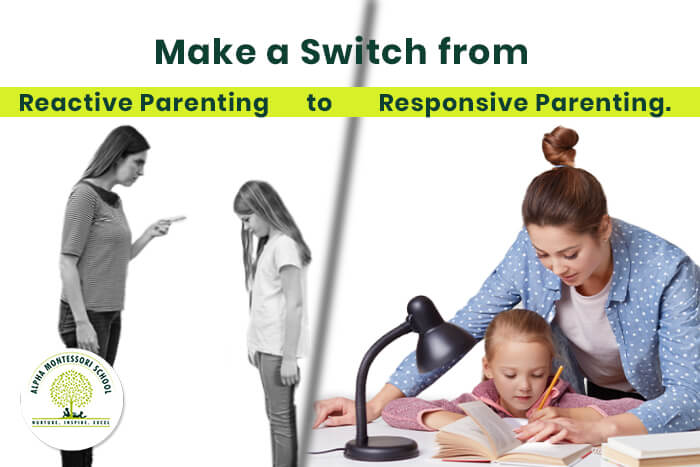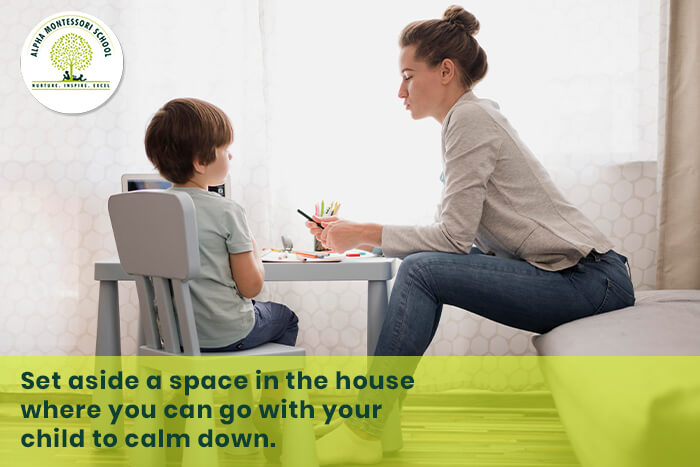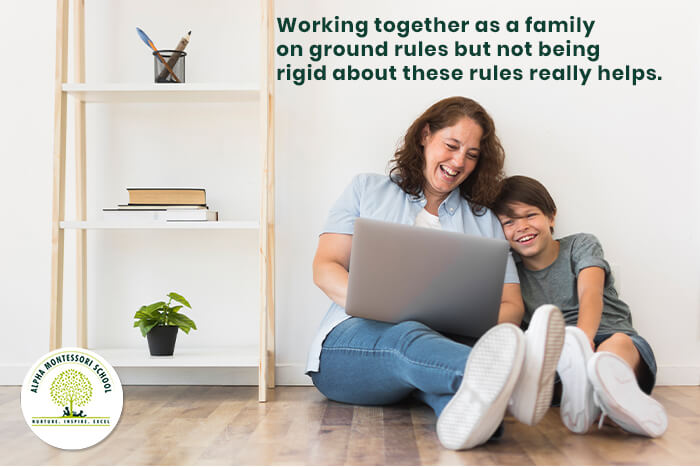When I was a young parent, a time-out was considered a good way to teach a child about actions and consequences. In the last decade, however, research on timeouts and punishment points to better alternatives. As the founder of a vibrant and wonderful private Montessori in Frisco and Plano, I have learned much from children and adults collaborating in different environments.
A study done by the National Institute of Mental Health by Michael Chapman and Carolyn Zahn-Wexler concluded that timeouts get children to cooperate only temporarily. Kids who were disciplined with misbehaved more than those whose parents took the time to role model positive behavior and talk to the children about their actions.
Why do we discipline our kids? It is simple. We want them to learn right from wrong. But punishment doesn’t make children understand right from wrong. If there is one thing we know, children need to motivate themselves. When adults discipline and punish them, they only produce external discipline or good behaviour for the sake of appearances.
In truth, children should want to make the right choices on their own. They should navigate the world and its problems using their moral courage and empathy. Sometimes, it becomes hard for us to distinguish what’s right from wrong and as parents, we cannot always be there to draw these boundaries for them.
Addressing the root cause
In her book Positive Discipline, Jane Nelson says, “Where did we ever get the crazy idea that in order to make children do better, first we have to make them feel worse? Think of the last time you felt humiliated or treated unfairly. Did you feel like cooperating or doing better?”
What does this mean for us as parents and caregivers? We often punish or scold a child because we want to hold them accountable for their behavior. Instead, what we must do is to make them accountable for their actions, whether an authority figure is present or not.
We punish our kids because we think that otherwise, they will grow up spoilt and will do the wrong thing. Punishment draws the attention to the child’s specific actions and tells him that because he did something, he will suffer certain consequences. We are doing two things here:
- We are focusing less on the child’s behavior to others and more on what we will do to him if he doesn’t adhere to rules.
- We are not helping a child address the emotions that got her to act the way she did and we are not addressing the root cause.
Connection before correction

We all yell at our children when we notice bad behavior. Let’s face it, we are human and we are living in the midst of a pandemic, so of course emotions and moods run high. Yelling, as human as it is, doesn’t do much. In fact, it cuts off a line of connection we have with our children. A parent once told me that she would yell at her daughter but when her husband yelled at the child and she was an on-looker, she looked at it from a different perspective and realized how horrible it felt. Sometimes we need to make a small but important switch from reactive parenting to responsive parenting.
What can we do instead of yelling or scolding our kids? You can note down your triggers and try to work on them. Also try and understand the difference between a reaction and a response. A reaction is a defense but a response is hearing your child’s side of the story and trying to understand the root cause of the behavior.
Express your feelings and also express their feelings too. It is good to say, “you are very upset that you cannot go to the park. I am feeling pretty mad too.” Take a break in case you think you are close to losing it. This is actually a good thing for the kids to see and they too can learn to breathe and become calm before saying or doing something.
Do check out The Orange Rhino Challenge for Parents, a no-yelling challenge that a parent started and which has now developed into a supportive community.
Time-outs are extrinsic, not intrinsic
When you give a time-out, you are forcing your child to sit somewhere away from you for a certain period of time. Yes, it certainly is good to model ‘space’ and how we need to give ourselves space when we are upset, but get this – when a child is overcome with big emotions, when you make her sit away from you, it doesn’t teach her anything and we miss a chance to connect and communicate. A child cannot make sense of those big and confusing emotions. They need us to help them through that task.

As an alternative, try time-ins. Go to a calm spot together and work on the issue together. You can set aside a space in the house where you can go with your child to calm down. If they are not keen to use that space, respect their decision. Find ways to address the problem together. Once you show them how it works, children in elementary and higher school environments understand this immediately and find different ways to calm themselves.
A good alternative is a Wheel of Choice. Here’s a nice example from a digital learning platform, BlendSpace You can turn the wheel and have options like ‘work on a quiet activity,’ ‘listen to a song,’ or ‘time-in.’
Role model behavior
Children watch us closely. They pick up our emotions and vibes. They mirror our anxieties. It is not possible to be calm, cool and collected all the time. It does, however, help if we establish ways to relax and deal with our own inner conflicts. When I was introduced to the idea of a Wheel of Choice, I thought it was a great idea for adults too! It doesn’t just offer solutions but it puts a pause after the problem.

With children, they are more willing to follow rules that they have worked with their parents to establish in the household. Working together as a family on ground rules but not being rigid about these rules really helps. In the end, it is important that children build self-esteem and empathy and self-concepts that will stand them in good stead in the years to come.
Here, it can be added that a space like a Montessori is a great way to establish these self-concepts. In a Montessori, children as young as 3 and 4 understand discipline not because it was enforced on them but because they internalize it and enjoy its rhythm. They also understand why they need to return things to their proper place or keep quiet during a certain activity. They are treated with respect and love right from the time they are toddlers. When they are older, they understand conflict resolution when a Montessori adult facilitates groups or collaborations in a positive and intrinsic way.
When working with your child on these challenges, be consistent in your approach. Also share with them how making mistakes is part of the learning process and it is important.
As a parent and an educator, I have realized that reacting only means recognizing the extrinsic, superficial aspects of a problem. The root cause is ignored. As an adult,it is interesting to watch how children respond or what they think of adults and a particular situation. All one needs is grace and a willingness to learn and grow.
About Alpha Montessori:
Alpha Montessori is a private school in Plano & Frisco, Texas offering Montessori programs for Infant, Toddler, Preschool and Lower elementary. We are currently serving Plano, Frisco, Allen, and McKinney in the North-Dallas area. We’re open year-round including the summer months and offer full or part-time child care programs, enrichment, and extracurricular programs to suit the needs of most families.
Book your School Visit today to discover your child’s journey at Alpha Montessori or Contact us for more information.

 January 6th, 2021
January 6th, 2021

Thank you for your sharing. I am worried that I lack creative ideas. It is your article that makes me full of hope. Thank you. But, I have a question, can you help me?
Thanks for sharing. I read many of your blog posts, cool, your blog is very good.
Thank you for your sharing. I am worried that I lack creative ideas. It is your article that makes me full of hope. Thank you. But, I have a question, can you help me?
Your point of view caught my eye and was very interesting. Thanks. I have a question for you.
Thank you for your sharing. I am worried that I lack creative ideas. It is your article that makes me full of hope. Thank you. But, I have a question, can you help me?
NQRSgSxNsgX
LG2PL24F2TF
Q41vUsK0EfS
QzzsUmMFwkz
QERB8WAExy4
PwI1e7OTO0G
7Qw3oHlwQIN
7QEO7yF2S7z
PL2h1YbfyeK
RXNMBkfb9BJ
rZRuZqpuksl
vxTqV4X0Fwv
Xxivmh2SwwZ
vFuM5fihGbX
Q8p9EHuIGuG
RTAT0pyPZJ5
2PWMJjm7cPX
W40joMfm9QE
sDcX5OuZq7q
3JREgnaH7yo
1XqZ2zS854V
eF1bSVeYZMp
BqU87jNMzP5
ZipY0zlCKBF
Xb6GO1gVXzx
5E1kMh53YvD
9fQS30MvA2P
uAoaw5PkIKU
fdiofWvcAB5
YPFVDUpohU4
wufhXF027sI
lyDQhjhxdtB
7qbyWuwf9i7
PEmydS15Hx3
OHvIRP7OQ9o
AtdLaRHk7eL
XGzKlkhVZGQ
ye4DCGyVYpN
Can you be more specific about the content of your article? After reading it, I still have some doubts. Hope you can help me. https://www.binance.com/en-IN/register?ref=UM6SMJM3